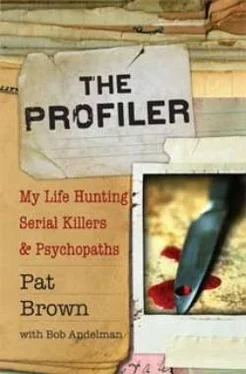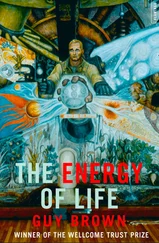It also framed the real challenge before me: I was a forty-plus housewife with a liberal arts degree trying to tackle crime investigation and justice issues, a totally unorthodox, self-trained crime analyst who hadn’t worked her way up in the field coming out of college. Who was going to listen to Pat Brown, homemaker, sign language interpreter, female, self-made profiler? How could I possibly accomplish the changes that I wanted to make in a male-dominated profession if I persisted in being the lady the media presented as simply a volunteer do-gooder? Women still struggle for respect outside the traditional roles for females and I was stepping into that daunting, mostly male arena. The wall seemed impossibly high to climb.
I realized that since I was over forty, I wasn’t going to get in on the ground floor and work my way up through the FBI. And I wasn’t going to get in on the ground floor with some other law enforcement organization either. So I made my own way. I didn’t have the luxury of time. And I already knew what I wanted to do: profile.
How could I get to the point where somebody would start listening to me and I could start affecting how profiling is used and how serial homicide investigations are conducted? What could I do to communicate with law enforcement and be taken as a serious professional and not as a bored housewife?
I consciously decided that I could achieve my goals if the media liked me and viewed me as a credible resource; then I could use the media to promote the advantages and art of criminal profiling. I set out to become a recognized name in the profiling field, not just locally but across the United States.
I also promised myself that when I was on television, I would always tell the truth. I would speak my mind, even when doing so was risky and might put me at odds with certain individuals or groups. Occasionally, I have been criticized, but it hasn’t stifled my beliefs or my voice.
I was still rather insecure, however, and received no outside support. I started with no idea of how to do these things. Not a clue. Could I actually work with police departments in far-flung areas of the country? Could I actually appear on television and speak my mind convincingly?
These were not activities in my comfort zone. I was familiar with my home. I was comfortable with curling up on the sofa with one of my babies. I was at ease doing sign language and interpreting for strangers in their time of need. I needed to convince myself anything was possible, and that I could do the impossible.
I also discovered that I had to become a businesswoman. But I had never run anything in my life. I didn’t run any clubs in school; I never even joined any. I wasn’t the cheerleader type. This was like shooting myself into space and having no idea how powerful the rocket strapped to my back would be, where I would land, or how I would ever get back to earth. But I learned what I needed to know to get where I wanted to go.
I am still a pretty terrible businesswoman, though, when it comes to victims and casework; I speak to victims for hours sometimes. I give them information and advice and don’t charge them. I would make a lousy lawyer. I also still do pro bono work and pay for all the expenses out of my own pocket. I learn a lot and I provide a good service, but I have been told that no one works for free, so why am I doing that? I don’t know. I guess it’s because I think the work needs to be done.
LIFE AFTER MURDER becomes a life possessed. Victims of violent crime can’t think of anything else. They want to learn who killed their loved one. That’s all they want to do. They don’t want to go to the movies, they don’t want to go to a birthday party, and they don’t want to read a stupid book. They just want to know who killed their daughter.
Unfortunately, their other children suffer. “Why don’t you care about me, Mommy?” And it isn’t that she doesn’t, but Mom just can’t think about anything else. Senseless murder weighs on one’s mind.
I’ve developed a methodology for those victims. I say to them, “In order to fight another day, you have to be mentally and physically healthy, or you are going to fail in your job to find your daughter’s killer. Get a box, a figurative box, put a bow around it, and imagine your daughter is in there. Your memories of her, the whole murder and everything else, are safe in that box. When you get up in the morning, take that box down from the shelf, and talk to your daughter. Say, ‘I’m going to be working on your case this afternoon at three.’ Then put the box back on the shelf, and do what you have to do. When you’re feeling unhealthy, take the box down, and say, ‘Honey, I’m going to go to the movies and laugh for a while. I need a little pressure off me so I can go find your killer.’”
I learned to do this myself. Finally.
THERE WAS A six-year gap from the day I turned in my information on Williams until the day he was finally considered a suspect. During that time I developed my skills to do criminal profiling. I trained myself, which has always been a major issue for a lot of people who say, “How dare you?” and “What makes you qualified?”
I hung up a shingle and called myself a profiler, and I’ve received a tremendous amount of flak for doing so. In the beginning it wasn’t even the purpose of my studies, but now that I had learned so much, profiling became my focus. I started a new organization, the Sexual Homicide Exchange (SHE), and this one would leave behind the political fight to push accountability and instead offer profiling services and police training and work to transform serial homicide investigations. This organization worked.
FOR A WOMAN who needed to become well known so she could make solid changes in cold cases throughout the nation, there was nothing like the one-two knockout punch of the Internet and cable television.
When the D.C. sniper case exploded in October 2002, it was the first of its kind, a killer or killers driving around the Washington, D.C., area, shooting people at random. Someone was shot at a bus stop, another at a gas station, a third while walking down the street. People throughout our area were afraid to go out in public to do everyday tasks such as pumping gasoline into their cars and trucks. The TV news media went into a frenzy seeking out experts for comments and opinions.
We got our first computer when my son, David, wanted to use one for schoolwork. It’s hard to remember when the Internet was so new, but David told me I ought to get an e-mail address and I actually asked him why. It seems laughable now. I wouldn’t be here today without the Internet. When I incorporated SHE as a nonprofit in 1996, I hired a Web designer and put together my first business Web site. When the D.C. sniper started shooting up the area, producers from cable television tossed “criminal profiler” into the search engine and they found me. I got my big break in television. During this random assault on Washington, I turned up on television for as many as eighteen hours a day. It was a crazy time, and I could be seen on every imaginable local broadcast and national cable news network, talking about who the sniper or snipers might be and what motivated their horrific rampage.
On one show, I appeared with a female ex-FBI profiler who said the sniper would be white. Why? “Because there are no black serial killers!” My mouth dropped open, aghast. I certainly couldn’t agree with that view; the perpetrator could be of any race. He-or they-was shooting from a distance. How would I know if they were white, black, Hispanic, male, or even female?
I appeared on a tremendous number of television news and talk programs in a short span of time and, by the time the D.C. snipers-there were two, both African American-were caught, my presence and expertise were established. I received a call from Montel Williams and soon appeared on his show. Then the phone started ringing off the hook. Desperate families contacted me as word got out that I worked pro bono; suddenly I was profiling for families and police departments.
Читать дальше












